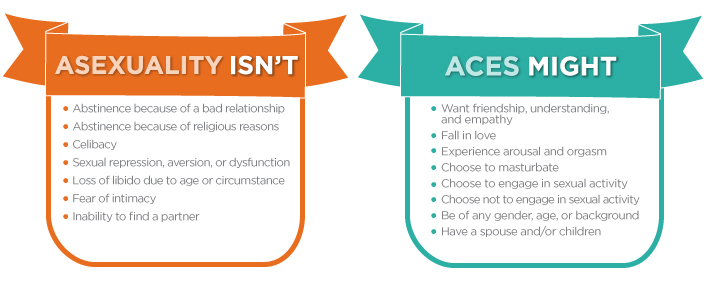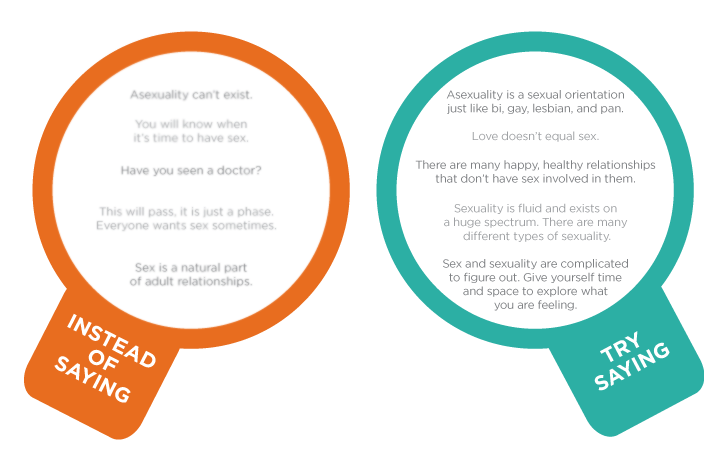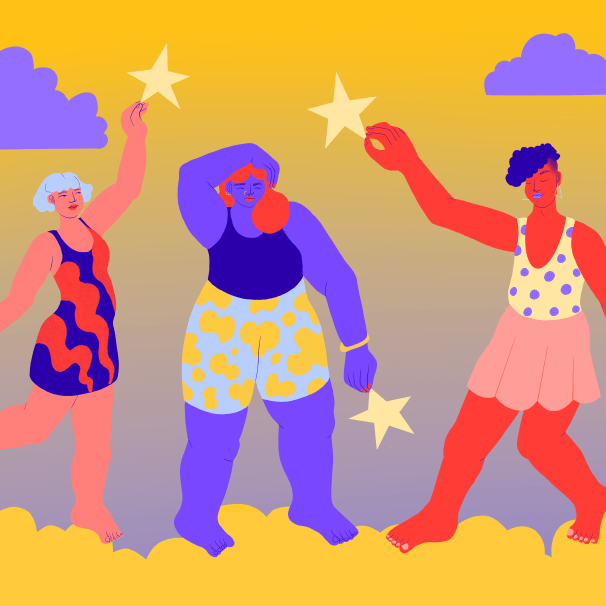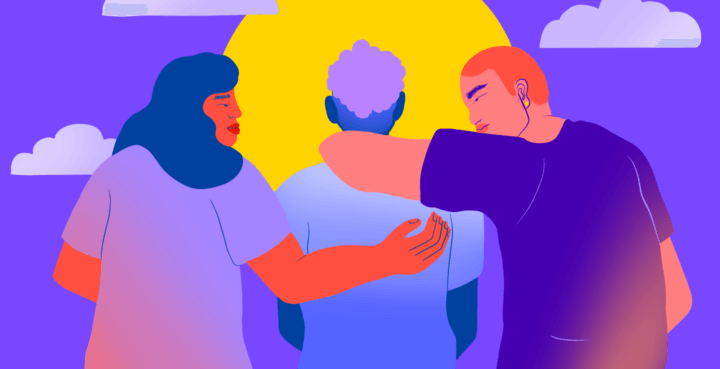Love doesn’t equal sex.
What is Asexuality?
It’s important to remember that asexuality is an umbrella term, and exists on a spectrum. Asexual people — also known as “Ace” or “Aces” — may have little interest in having sex, even though they desire emotionally intimate relationships. Within the ace community, there are many ways for people to identify.

Common terms and identities on the asexual spectrum include:
- Demisexual: People who only experience sexual attraction once they form a strong emotional connection with another person.
- Grey-A: People who identify somewhere between sexual and asexual.
- Queerplatonic: People who experience a type of non-romantic relationship where there is an intense emotional connection that goes beyond a traditional friendship.
Asexuality & Romantic Relationships
Aces commonly use hetero-, homo-, bi-, and pan- in front of the word romantic to describe who they experience romantic attraction to. For example, an asexual person who is hetero-romantic might be attracted to people of a different sex or gender, but not in a sexual way.

Frequently Asked Questions About Asexuality
- My friends talk about sex all the time, but I don’t feel any desire to be with someone in that way. Is it normal to not feel any sexual attraction towards other people?
- I am romantically attracted to boys and girls, but I don’t want to be with them physically. Can I be bisexual and asexual?
- I kissed my boyfriend for the first time and it was gross! Does this mean I am asexual?
- How do I tell my partner/the person I like that I am asexual?
- People are telling me that something is wrong with me now that I’ve come out as asexual. Even worse, some are saying that asexuality doesn’t exist. How can I help them understand me?
Question 1: My friends talk about sex all the time, but I don’t feel any desire to be with someone in that way. Is it normal to not feel any sexual attraction towards other people?
Answer: Yes, it is completely normal to not feel sexual attraction towards other people. Love doesn’t have to equal sex! You can have strong, meaningful relationships with friends or partners that don’t necessarily involve a sexual connection. In fact, there is a huge spectrum of identities and sexualities out there that can help describe different kinds of attraction. We encourage you to learn more about identities like asexuality, which may help you feel more at ease about not feeling sexually attracted to others. Remember, nothing is set in stone, and you don’t have to label yourself with a term unless you’re ready. Your feelings may or may not change over time, and that is completely okay!
Question 2: I am romantically attracted to boys and girls, but I don’t want to be with them physically. Can I be bisexual and asexual?
Answer: Absolutely! Because you feel romantically attracted to others, you may feel comfortable using the term “romantic” instead of “sexual,” then adding “bi-“ to show that you’re attracted to both boys and girls. This creates a term that’s commonly used in the asexual and ace community: “biromantic.” Another term for you to explore could be panromantic, which describes a person who is romantically attracted to others, but their attraction is not limited by the other person’s sex or gender.
Question 3: I kissed my boyfriend for the first time and it was gross! Does this mean I am asexual?
Answer: Not necessarily. There are a lot of things that make up our identity, and who we are physically and romantically attracted to can be discovered over time in many different ways. It sounds like you are listening to yourself and are in touch with your feelings – that’s an awesome first step! What you experienced is perfectly normal, even though being grossed out by your first kiss might have been confusing.
People who identify as asexual experience little or no sexual attraction to others. Asexual people, or “aces,” often identify somewhere on a spectrum that includes their emotional, spiritual and romantic attraction to other people.
It might be helpful to think about how you feel about your boyfriend, too. How do you feel about him romantically, spiritually, and emotionally? Remember, love does not automatically equal sex or being physical. In fact, there are many happy, healthy relationships that don’t involve those things.
So, are you asexual? That’s up to you to decide, because you know yourself best! You might do some more research and find out that “asexual” is a good way to describe yourself – or, you may find another term that fits your feelings better. Give yourself time and space to explore what you are feeling. You are not alone!
Question 4: How do I tell my partner/the person I like that I am asexual?
Answer: This is a tough question, and there isn’t any easy answer. Coming out to ANYONE can be scary, and many people in the ace community face specific risks when coming out, like being rejected by a partner or love interest. Some asexual people even voice fears of never finding a partner who will accept them for who they are. However, there is a whole community out there that is able to offer support. We recommend checking out AVEN. The Trevor Project also has a great resource for coming out for anyone who chooses to do so.
You deserve love and happiness, and we hope that you will find someone who will love you for the amazing, whole person that you are! You should NEVER feel pressured to have sex with someone if you don’t want to, no matter how much you like them. If someone doesn’t accept you for being asexual, then they might not be the right person for you.
Question 5: People are telling me that something is wrong with me now that I’ve come out as asexual – even worse, some are saying that asexuality doesn’t exist. How can I help them understand me?
Answer: It sounds like you are honestly and bravely sharing your feelings with the people you love and depend on, but that they aren’t hearing, understanding or validating you. That’s really tough, especially because having the support of family and friends can make such a huge difference as we’re discovering who we are. We want you to know that being asexual is completely valid and normal, and that you have our full support!
It might help to explain to the people in your life that asexuality is a sexual orientation just like being bi, gay, lesbian, pan, or straight – it all comes down to how you are attracted to other people, in what ways. Remind them that you can have strong, meaningful relationships with friends or partners, even if you aren’t being physical with them. You can also try and connect them with some resources, like the ones at the bottom of this page, so they can do some research on their own.
Ultimately, we can’t change how other people respond to us, or force them to understand who we are. What we can do is share our stories and make meaningful connections with others who are ready to accept us for who we are. You are an amazing gift to the world, and we are so happy that you are being authentically yourself.
Additional Resources for Understanding & Supporting People on the Asexual Spectrum
- Asexual & Ace Statistics Among Young People
- AVEN – The Asexual Visibility and Education Network – Includes Forum
- Asexual Awareness Week
- Celebrating Asexual Awareness Week
- Asexuality 101
- Asexual Groups – World List
- The Invisible Orientation
- Asexuality: A Brief Introduction PDF (Asexuality Archive)
- Planned Parenthood: Sexual Orientation
Through The Trevor Support Center, you are able to link to other websites which are not under the control of The Trevor Project. The Trevor Project does not review or ensure the accuracy of the content on other sites.
Help us continue to provide 24/7 support to LGBTQ+ young people and empower allies to deepen their commitment through advocacy, education, and affirming content.


